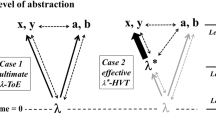Abstract
We suggest a rigorous theory of how objective single-case transition probabilities fit into our world. The theory combines indeterminism and relativity in the “branching space–times” pattern, and relies on the existing theory of causae causantes (originating causes). Its fundamental suggestion is that (at least in simple cases) the probabilities of all transitions can be computed from the basic probabilities attributed individually to their originating causes. The theory explains when and how one can reasonably infer from the probabilities of one “chance set-up” to the probabilities of another such set-up that is located far away.
Similar content being viewed by others
References
J.S. Bell (1964) ArticleTitle‘On the Einstein–Podolsky–Rosen Paradox’ Physics 1 195–200
N. Belnap (1992) ArticleTitle‘Branching space–time’ Synthese 92 385–434 Occurrence Handle10.1007/BF00414289
N. Belnap (2002a) ‘Double Time References: Speech-act Reports as Modalities in an indeterminist Setting’ F. Wolter H. Wansing M. Rijke Particlede M. Zakharyaschev (Eds) Advances in Modal Logic NumberInSeriesVol. 3 World Scientific Co. Pte. Ltd. Singapore 37–58
N. Belnap (2002b) ‘EPR-like ‘Funny Business’ in the Theory of Branching Space-times’ T. Placek J. Butterfield (Eds) Nonlocality and Modality Kluwer Academic Publishers Dordrecht 293–315
Belnap N. (2002c). ‘A theory of causation: Causae causantes (originating causes) as inus conditions in branching space-times’. Forthcoming, British journal for the philosophy of science. A preprint of this essay may be obtained from http: //philsci-archive.pitt.edu
Belnap, N.: 2003a, ‘Branching space–time, postprint, January, 2003’. This is a postprint of (Belnap, 1992) that includes a number of additional explanations and a little re-structuring. It may be obtained from http://philsci-archive.pitt.edu.
N. Belnap (2003b) ArticleTitle‘No-common-cause EPR-like Funny Business in Branching Spacetimes’ Philosophical studies 114 199–221 Occurrence Handle10.1023/A:1024900720697
N. Belnap M. Perloff M. Xu (2001) Facing The Future: Agents and Choices in Our Indeterminist World Oxford University Press Oxford
Coffa, J. A.: 1973, ‘Foundations of inductive explanation’. Ph.D. thesis, University of Pittsburgh.
Eagle, A.: 2003, ‘20 Arguments Against Propensity Analyses of Probability’. Forthcoming, Erkenntnis
G.N. Fleming (1965) ArticleTitle‘Covariant Position Operators, Spin, and Locality’ Physical review B 137 188–197
Lewis, D.: 1980, ‘A Subjectivist’s Guide to Objective Chance’, in: R. Jeffrey (ed.), Studies in Inductive Logic and Probability, Vol. II, University of California Press. [Reprinted in (Lewis, 1986)], pp. 83–132.
D. Lewis (1986) Philosophical Papers NumberInSeriesVol II Oxford University Press Oxford
T. Müller (2002) ‘Branching Space–time, Modal Logic and the Counterfactual Conditional’ T. Placek J. Butterfield (Eds) Non locality and Modality Kluwer Academic Publishers Dordrecht 273–291
Müller, T.: 2003, ‘Probability Theory and Causation: A Branching Space-times Analysis’, unpublished. Department of Philosophy, Bonn University.
Oksanen, M.: 2003, ‘Causality and events in branching space-time’. Unpublished.
T. Placek (2002) ‘Partial indeterminism is Enough: a Branching Analysis of Bell-type Inequalities’ T. Placek J. Butterfield (Eds) Non locality and Modality Kluwer Academic Publishers Dordrecht 317–342
T. Placek (2003a) ‘On Belnap’s branching Space-times’ J. Hintikka T. Czarnecki K. Kijania-Placek T. Placek A. Rojszczak (Eds) Philosophy and Logic. In Search of the Polish Tradition Kluwer Academic Press Dordrecht 77–92
Placek, T.: 2003b, ‘On objective transition probabilities’. Working document.
T. Placek J. Butterfield (Eds) (2002) Non-locality and Modality Kluwer Academic Publishers Dordrecht
W.C. Salmon (1984) Scientific Explanation and the Causal Structure of the World Princeton University Press Princeton
M.F. Sharlow (1998) ArticleTitle‘A New Non-Hausdorff Space-time model for Resolution of the Time Travel Paradoxes’ Annals of physics 263 179–197 Occurrence Handle10.1006/aphy.1997.5772
Sharlow, M. F.: 2003, ‘The quantum mechanical path integral: toward a realistic interpretation’. Unpublished and copyright. See http://www/eskimo.com/~msharlow.
R.H. Thomason (1970) ArticleTitle‘Indeterminist Time and Truth-value gaps’ Theoria 36 264–281
B.C. Fraassen Particlevan (1980) The Scientific Image Oxford University Press Oxford
Weiner, M.: 1997, ‘Probability in Branching Space-time’. Unpublished. Department of Philosophy, University of Pittsburgh.
Weiner, M.: 2003, ‘Testimony: Evidence and Responsibility’. Ph.D. thesis, University of Pittsburgh.
M. Xu (1997) ArticleTitle‘Causation in Branching Time (I): Transitions, Events and Causes’ Synthese 112 137–192 Occurrence Handle10.1023/A:1004948726086
Author information
Authors and Affiliations
Corresponding author
Additional information
We thank Tomasz Placek for his significant help via an extensive and instructive correspondence, Thomas Müller for numerous eye-opening conversations and for his corrections to and comments upon a long sequence of drafts, both Placek and Müller for pre-publication sharing of their results, and Christopher Hitchcock for a number of suggestions.
Rights and permissions
About this article
Cite this article
Weiner, M., Belnap, N. How Causal Probabilities Might Fit into Our Objectively Indeterministic World. Synthese 149, 1–36 (2006). https://doi.org/10.1007/s11229-004-6240-4
Issue Date:
DOI: https://doi.org/10.1007/s11229-004-6240-4




